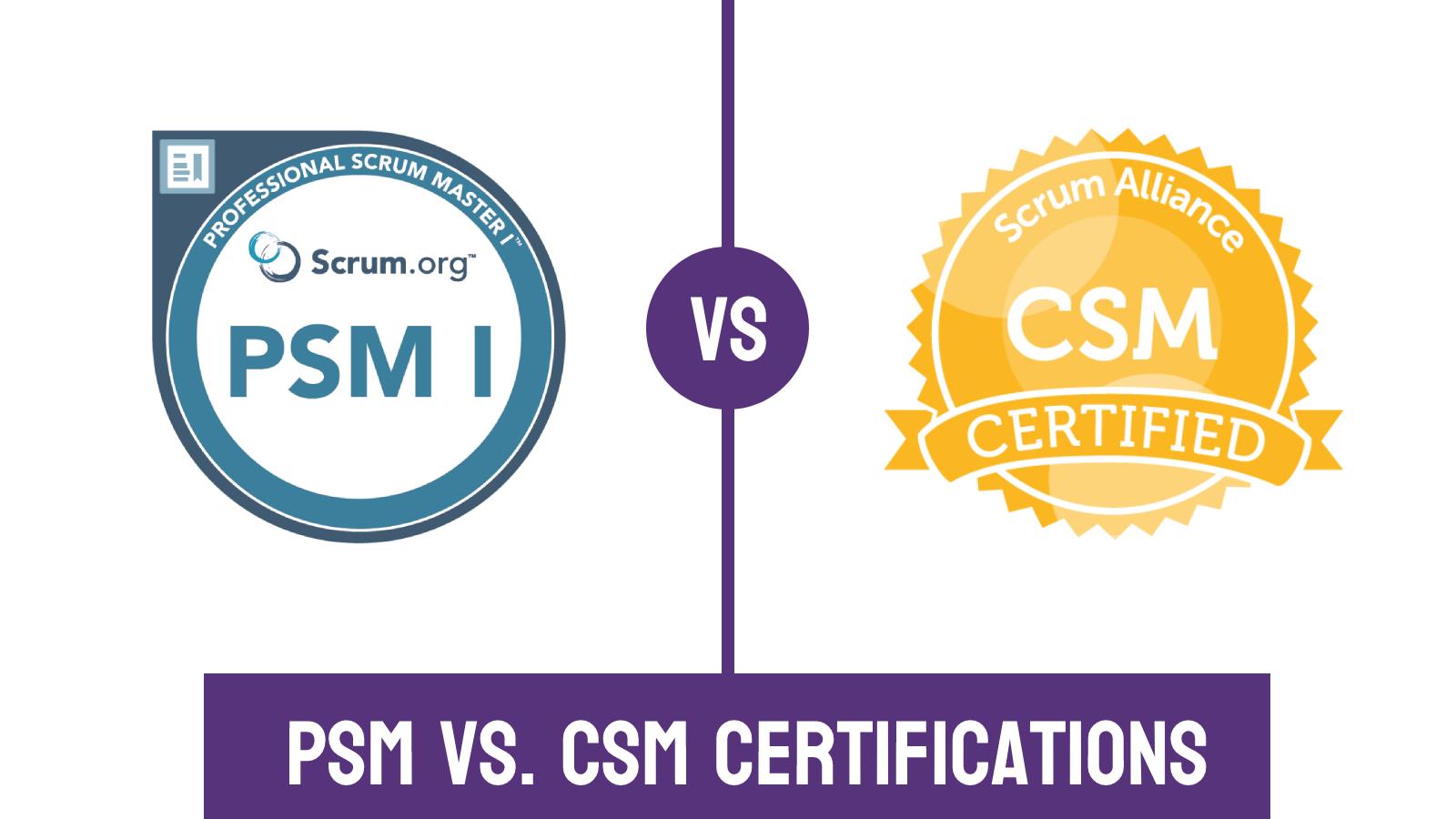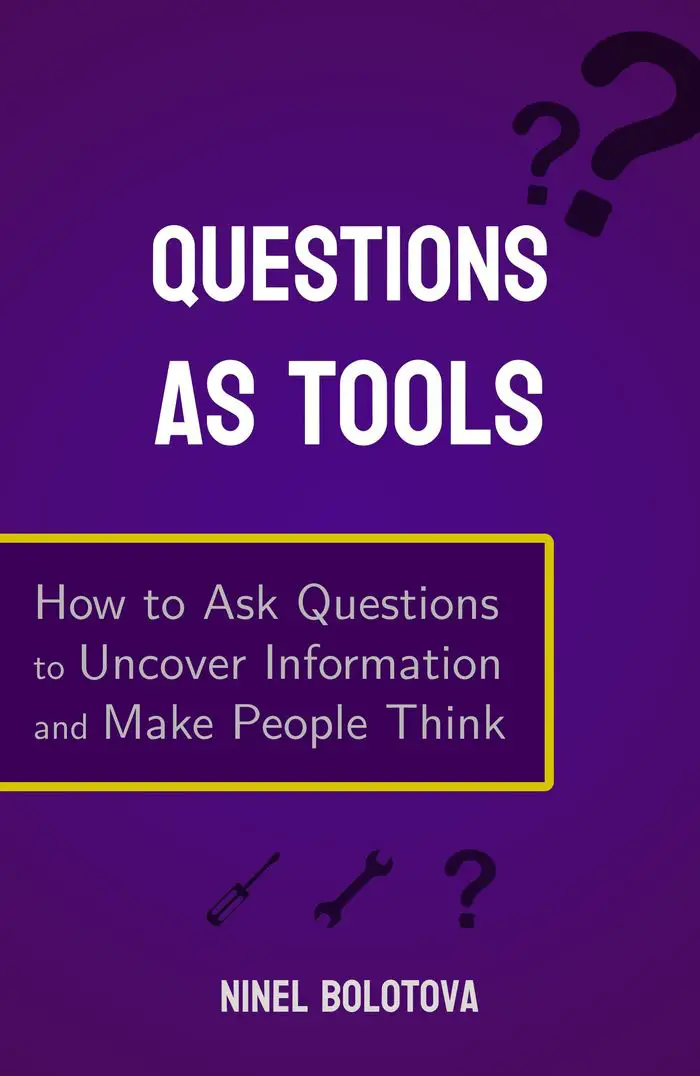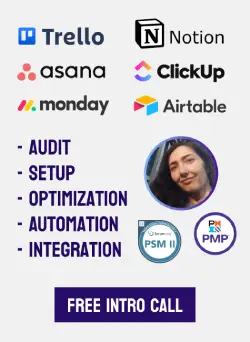PSM vs. CSM: which Scrum certification is the best choice?
Scrum is a framework for solving complex problems. It’s mainly used for software and product development but could be applied to any project with evolving requirements and short feedback loops.
Obtaining a Scrum certification is a way of transitioning into a new role, developing an Agile mindset, and improving your practical application of the framework.
Professional Scrum Master by Scrum.org and Certified Scrum Master by Scrum Alliance are the most popular certifications for people planning to take on the Scrum Master role or already working in that role and wishing to formalize and improve their knowledge and practices.
Both certifications are well-recognized, but the ways they are obtained have some distinct differences. What are the advantages, requirements and costs of each? Which would provide an experience you benefit the most from?

CSM and PSM certification levels and requirements
Both PSM and CSM have three levels – foundation, advanced and expert.
Professional Scrum Master levels and pre-requisites
PSM I. Validates the knowledge of the framework as described in the Scrum Guide, the Scrum Master accountabilities, and how to apply Scrum in the Scrum Teams.
The PSM I exam is mainly aimed at testing your knowledge and understanding of the Scrum Guide.
Related: A guide to preping for the PSM I exam.
PSM II. Meant for Scrum Masters with in-depth experience applying the framework in real-world scenarios. A year of work experience is recommended but not required.
The PSM II exam asks you situational questions to test your interpretation of the Scrum Guide and the Scrum Master role in different situations.
Related: PSM II exam study guide.
PSM III. Validates the understanding of applying Scrum practices and values in complex scenarios. It is recommended to have extensive work experience as a Scrum Master, as you’ll have to draw from your experience to answer the questions. Meant for individuals at a level of mastery sufficient to coach others.
80% of the PSM III exam are open questions you need to write answers for, and the rest have multiple answers.
Related: Strategies for passing the PSM III exam.
To attempt any one of the PSM exams, you buy a non-expiring, single-use access code and apply it whenever you feel ready. The exams aren’t proctored.

Certified Scrum Master levels and prerequisites
Certified ScrumMaster (CSM). An entry-level certification on the ScrumMaster track. No pre-requisites, but you must complete a course by an approved provider. The CSM non-proctored exam is included in the training course.
Advanced Certified ScrumMaster (A-CSM). Requirements: having a certification of the previous level (CSM) and validating a minimum of 12 months of work experience specific to the Scrum Master role within the last five years.
Certified Scrum Professional - ScrumMaster (CSP-SM). Requirements: having an active A-CSM certification and validating a minimum of 24 months of Scrum Master work experience within the last five years.
To obtain the A-CSM and CSP-SM certifications, you must enroll in an approved study course and complete all the assignments. There are no separate exams.
Related: Is the Scrum Master role a great fit for me?

photo by @mimithian on Pexels
Is taking a course necessary to obtain PSM and CSM?
PSM and CSM classes are typically 2-day in-person or live virtual seminars. Some CSM options have shorter sessions spread over multiple weeks, but either way, the total running time of training is about 16 hours.
Classes are available in different languages and currencies, but the price averages are approximately in the same range if converted to USD.
For the CSM certifications, taking a course is mandatory. Courses start at around $500 for CSM, and most of them are under $1000. A-CSM and CSP-SM have higher averages, with CSP-SM averaging around $1300.
PSM classes are recommended but optional. If you take a class for a PSM I or PSM II, you get a free attempt at the associated certification. If you completed the PSM II class, you’re also eligible for a 40% discount on the PSM III exam. Classes start at $1000.
As Scrum.org notes, attending a class is advisable and gives a lot of insights, but in and of itself it most likely won’t be sufficient to pass the exams, especially on a higher level. You need to get ready by studying the Scrum Guide and other materials on the subject. They have a Scrum Master Learning Path with various free articles and videos.

photo by @janesky on Pexels
PSM I vs. CSM exam details
I’ll focus on comparing the first level of both certifications - PSM I and CSM. This would be the most topical for people at the beginning of their Scrum journey, considering which path to take.
Besides, CSM is the only level of Scrum certification by Scrum Alliance that has an official scored exam.
Certified Scrum Master exam details:
- Price: included in a mandatory paid course of your choice.
- Number of questions: 50 multiple-choice questions.
- Passing score: 74%.
- Duration: 60 minutes.
- Attempts: 2 free attempts. An additional attempt could be purchased for $25.
Professional Scrum Master I exam details:
- Price: $150.
- Number of questions: 80 questions: multiple-choice, multiple-answer, true/false.
- Passing score: 85%.
- Duration: 60 minutes.
- Attempts: 1 attempt. If you take a class, an attempt is included in the price.
Is PSM I more difficult than CSM?
The duration is the same (60 minutes), but PSM I has 60% more questions (80 vs. 50 for CSM), and its passing score is 10% higher.
This means that to achieve a passing score of 74% for CSM, you need to answer at least 37 questions correctly in an hour. This gives you over one and a half minutes per question, on average.
To pass the PSM I exam with a score of at least 85%, you’ll need to give 68 correct answers within the same time. This translates into an average of less than a minute per question.
Based on those numbers alone, PSM I is over 1.5 times harder than CSM.
But things are further complicated with the question types. CSM consists of multiple-choice questions, i.e. questions that have only one correct answer.
PSM I has multiple-answer questions, which are more tricky - you could stop for a good minute, second-guessing yourself. True/false could also misfire if you don’t pay attention or misinterpret the question and answer the opposite of what has been asked.
Taking those into consideration, I estimate PSM I to be at least twice harder than CSM.
Related: Should I become a project manager?

photo by @louisemink on Unsplash
PSM and CSM recertification costs
When you’re about to purchase something, you should also consider the maintenance costs. Let’s see how much you need to invest once you successfully passed the CSM or PSM exam.
Do you need to renew your PSM certification?
Scrum.org focuses on pure Scrum. Scrum is a framework, not a methodology. The framework is lightweight and doesn’t change, save for the small nuance updates once a few years.
Once you passed a tough exam, you demonstrated a certain level of understanding of the framework and the ability to interpret it in different scenarios.
If you get it, you get it. You don’t need to confirm it every few years – PSM certifications are valid for a lifetime and don’t have renewal fees.
And I could attest from personal experience passing the PSM test – after all the preparation you went through, Scrum principles and approaches get so ingrained that you’re unlikely to forget them in a few years, if ever.
Once you have such solid foundations, you could build on Scrum as you see fit in your environment. This is called “Scrum, and…”. As opposed to “Scrum, but…” – when people claim they use Scrum but find excuses to omit or change some elements of the framework.
What are the renewal costs for CSM, A-CSM and CSP-SM?
The angle of Scrum Alliance is more about professional growth in the changing environment, about networking and conferencing. The expectation is for you to continuously confirm and grow your professional status by earning education units, attending training, and paying the recertification fee.
Scrum Alliance certifications need to be renewed every 2 years.
You have to earn a certain number of Scrum Education Units by performing learning activities like attending events, volunteering, and writing articles.
There are a few levels of certification Scrum Alliance offers: Leadership, **Foundational **(where CSM is), Advanced, and Professional. Each level has a few associated certifications – Scrum Master, Product Owner, Developer.
Required certification units and recertification costs for the Scrum Master track:
- CSM: 20 SEU, $100 renewal fee.
- A-CSM: 30 SEU, $175 renewal fee.
- CSP-SM: 40 SEU, $250 renewal fee.
If you have certifications on different levels, you only need to pay to renew the top-level one, the rest renew automatically. But you need to submit at least half of SEUs required for each of the certifications on a different track.
Attending a higher-level certification course automatically renews all lower-level certifications.
Related: this article goes into detail about obtaining SEUs to renew your certifications by Scrum Alliance.

photo by @fauxels on Pexels
Digital badges for CSM and PSM
Scrum Alliance digital badges are issued by BadgeCert.
Scrum.org badges are issued by Credly. Certifications you completed could also be viewed on your Scrum.org profile.
What do employers value more: CSM or PSM?
Searching for “CSM Scrum” on Indeed yields more results than “PSM Scrum”.
However, once you open the actual job posts, they say “CSM or PSM I”, “CSM or equivalent”, and mention other agile and project management certifications like CSPO, PMI-ACP, and PMP. So, in the eyes of the employers, CSM and PSM I are roughly the same.
According to ZipRecruiter, the average Certified Scrum Master salary is around $120k/year, which is under $60/hour. But hourly averages vary from $40 to $80 per hour, depending on location and other factors. The most common annual figure (35% of the range) is around $100k/year.
Is PMI-ACP a good alternative to PSM and CSM?
PMI Agile Certified Practitioner is a certification provided by Project Management Institute. Their PMP certification is the most recognized project management credential in the world.
Besides Scrum, PMI-ACP tests the knowledge of other Agile approaches, like Kanban, Lean, and test-driven development (TDD), and their application in real-world scenarios. It’s a more general certification for project managers working in an Agile environment.
Experience requirements: 12 months of general project experience in the last 5 years, or 8 months of Agile project experience in the last 3 years.
Exam format: 3 hours, 120 multiple-choice questions. The passing score is not disclosed, but the general advice is to aim for a passing score of a minimum of 75-80% in the exam simulators.
Exam cost. PMI-ACP exam fee is $435 for members and $495 for non-members.
Maintenance fees. During the 3-year renewal cycle, you need to earn 30 Professional Development Units (PDUs) via continuous education and work-related activities. PMI-ACP renewal fee is $60 for PMI members and $150 for non-members.
Digital badges. PMI digital badges are issued by Credly.
What is DASM by PMI?
PMI actually has a certification related specifically to Scrum Mastery, Disciplined Agile Scrum Master (DASM). To obtain it, you have to take a course: $500 for a self-paced online course for non-members, and around $700+ for instructor-led training. Then you’re given a few free attempts to pass the exam.
Yearly renewal fee for DASM is $50 ($20 for PMI members), and a few PDUs need to be submitted.
So, it’s the same acquisition and maintenance model as CSM, but with a fraction of name recognition for the certification.

photo by @visual-tag-mx-1321732 on Pexels
Related: CAPM: a certification for project management beginners.
PSM vs. CSM vs. PMI-ACP: which one is right for you?
There’s a combination of factors that could influence the decision. Ask yourself a few questions:
- Do I have experience?
- Do I want to be a Scrum Master or an Agile Project Manager?
- Do I like tough challenges?
- How much am I willing to pay for the preparation, the exam, and the maintenance?
So, for example, PSM I (and even PSM II, at $250) has the lowest cost for the exam and zero maintenance, but it’s harder to pass than the alternatives.
Or, if you want to play it safe, passing a CSM course would basically guarantee you a credential at the same price as the PMI-ACP exam attempt. But you’ll end up having to maintain a certification with a narrower scope.
Consider your decision in the context of your long-term strategy.
Ninel’s pick of the Scrum certification
The following factors have influenced my decision:
- I like actively expanding my knowledge via self-education.
- I enjoy challenges.
- I’m wary of situations where you have a compulsory payment to get access to a skill-based evaluation.
- The less maintenance, the better.
- A Credly credential could be integrated with other platforms like Upwork to show your achievements easier (though all digital badges could be integrated with LinkedIn).
Thus I went straight for PSM II, and the understanding of Agile approaches that got ingrained in my head during the preparation was a solid basis for passing my PMP exam.
Here’s my strategy to pass an exam on the first try.

 Ninel Bolotova, PMP, is a workflow expert setting up and automating processes in ClickUp, Trello, Notion, Monday and other PM tools. She enjoys challenges related to process setup, automation and optimization.
Ninel Bolotova, PMP, is a workflow expert setting up and automating processes in ClickUp, Trello, Notion, Monday and other PM tools. She enjoys challenges related to process setup, automation and optimization.